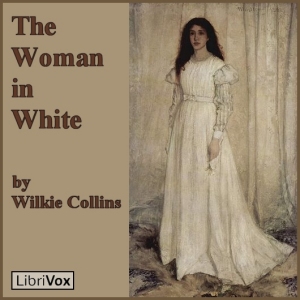Archive
Book Review: The Woman in White by Wilkie Collins
 Summary:
Summary:
Originally serialized in 1859 to 1860 then published in book form in 1860 this epistolary novel is considered one of the first mystery novels. Walter Hartright is an artist who gets hired to be a drawing master for two half-sisters Laura Fairlie and Marian Halcombe. He and Laura soon fall in love, but they cannot be together due to class differences and Laura’s prior promise to her now deceased father to marry Lord Percival Glyde. A mysterious woman dressed all in white warns Laura against her marriage, calling Lord Glyde evil. However, Laura is reluctant to renege on her final promise to her father and proceeds with her marriage, sending herself, Marian, and Walter into a spiral of intrigue and danger.
Review:
I love slow-moving, epistolary novels, particularly gothic ones read on a long, hot summer day. One of my finest reading memories is of enjoying Dracula while working on a summer internship at a national park on a peninsula with four beaches. So I came to this gothic, mysterious, epistolary novel with high expectations. At first they were met, but as the plot proceeded I came more and more to want to smack Collins upside the head.
Without giving away too much, suffice it to say that the slowly building tension indicates a truly serious infraction on Lord Percival Glyde’s part that turns out to be not particularly shocking at all. At least to my American mind. Suffice it to say, it revolves around title holding, something which I find baffling and laughable. Why should anyone care if Laura is Mrs. Glyde or Lady Glyde? Her life seems more boring than the servants’ anyway. I thought I would be reading a novel that was more about revealing the treachery and debauchery of the upper class. Instead I got a book about bourgeois problems, which, I’ve indicated elsewhere on this blog, I simply cannot relate to and find completely annoying. I get it that some people enjoy that, but the desire to maintain a tense, mysterious illusion around the book led me to believe it’s something it wasn’t. That is frustrating, to say the least.
Beyond the disappointing mystery there’s of course the typical problems found in early 1800s literature. The sexism comes from Marian’s own mouth, which is surprising given that she is a depicted as a strong woman. She often will lament the short-comings of “her sex.” Actually, the entire situation between Walter, Marian, and Laura is baffling. Laura is a weak, foolish girl who Walter falls and stays head over heels in love with. I cannot fathom why that would be when he spends an equal amount of time with Marian, who is a strong, thoughtful, intelligent woman. Laura is described as beautiful, whereas Marian is described as possessing a beautiful body but an unfortunately masculine face. This leads me to believe Walter is rather shallow, as I see no reason beyond Laura’s beauty for his devotion to her. I know sexism is to be expected in older novels, but I would at least hope for a hero who loves the heroine for something beyond her beauty.
That said, the novel certainly gives modern women a new appreciation for our current situation. The women in The Woman in White are constantly downtrodden by the men around them who believe it is entirely within their right to dictate to them everything about how they should behave, speak, dress, etc… It appears that the only thing the women have control over is when to leave the men to their wine after dinner. In fact the couple presented as the happiest and most well-functioning is that of Count Fosco and his wife, and they only function well due to the fact that she obeys his every command. Mrs. Fosco is described as a woman who prior to meeting the Count was loud, obnoxious, and always yammering on about women’s rights. Count Fosco, apparently, “fixed all that,” and she is now such a pleasant woman to deal with. The only woman who does not base her entire existence around a man is Marian, and that is due to her bizarre, near worshipful devotion to Laura. It makes me shudder to think if those had been my options as a woman–existing purely for the whims of a man, downtrodden and outcast, or pure devotion to a sister. Yeesh.
I did enjoy listening to the book. It felt a bit like listening to an old-time radio program, which I’m sure is due to its origin as a serial novel. Those who enjoy the slower pace of older novels and can relate to the bourgeoisie will probably enjoy it. If either of those elements turns you off, however, you should look elsewhere.
2.5 out of 5 stars
Source: Librivox recording via the Audiobooks app for the iTouch and iPhone


